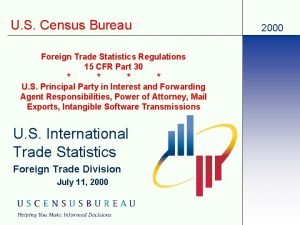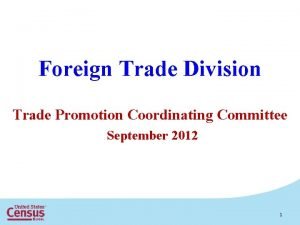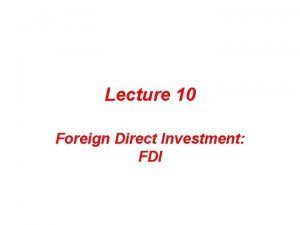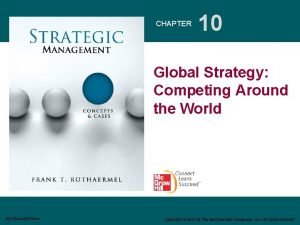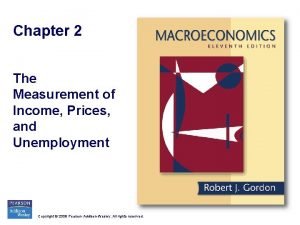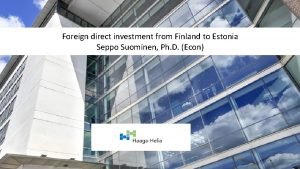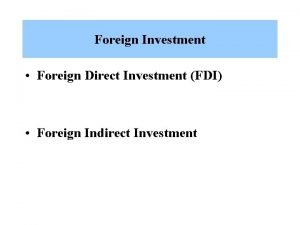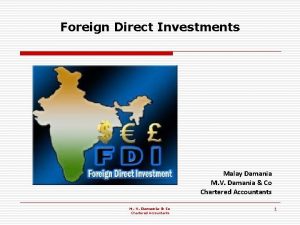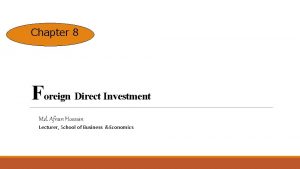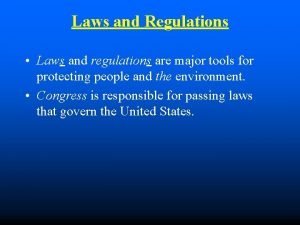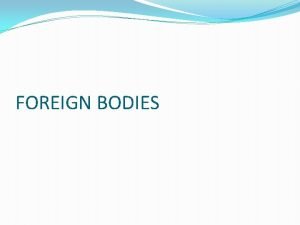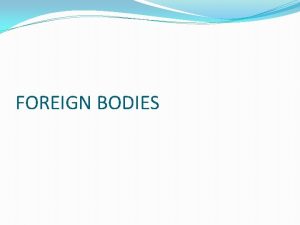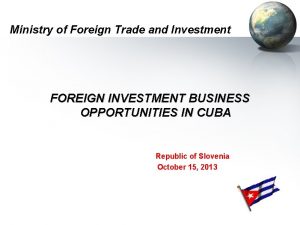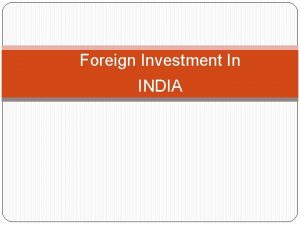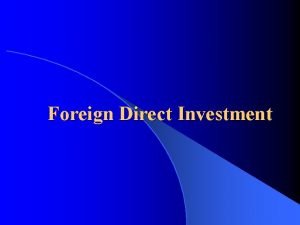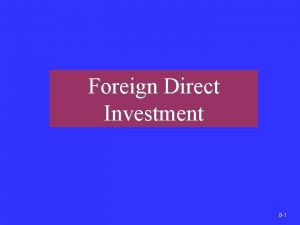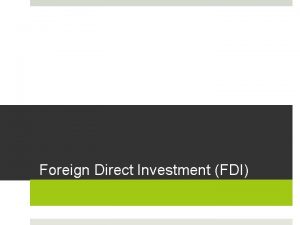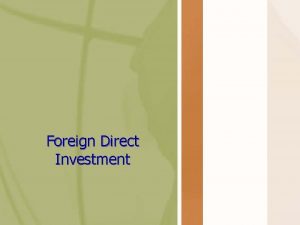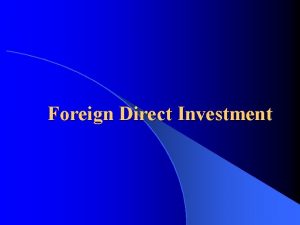Laws and Regulations on Foreign Investment in the















- Slides: 15

Laws and Regulations on Foreign Investment in the Middle East UAE, Saudi Arabia, Qatar, Bahrain and Oman Tony Maalouli Pro. Consult Advocates & Legal Consultants

Introduction Liberalization of International Capital Flows Legal and Economic Reforms required by WTO Major regulatory restrictions

The Jurisdictions v Which jurisdictions were studied? v Kingdom of Saudi Arabia; v United Arab Emirates; v Qatar; v Bahrain; v Oman

Key Elements in Investment Laws v Which sectors are covered by the investment laws of the respective jurisdictions? v What are the benefits and incentives offered by the investment laws? v Which authorities are vested with the power to enforce the investment law in the different jurisdictions?

Regulatory Environment of Foreign Investment Kingdom of Saudi Arabia - Very adjustable system of law, however difficulty to apply clearly established rules. - The New Saudi Foreign Investment Act set the foundation for a paradigm change in the investment climate. - Major Positive Developments: § (1) one-stop-shop approach (SAGIA is the only agency dealing with foreign investment). § (2) 100 percent foreign owned projects are allowed (Article 5). § (3) all fields are open for investment except for those included in the Negative List.

Regulatory Environment of Foreign Investment Kingdom of Saudi Arabia MAJOR REGULATORY RESTRICTIONS ON FOREIGN DIRECT INVESTMENT

Regulatory Environment of Foreign Investment Kingdom of Saudi Arabia v The Sectors (Negative List) – All investment activities are permitted in KSA except those excluded by the competent authority. – The following activities are excluded: • I. Industrial Sector: • • • Oil exploration, drilling and production. Except the services related to mining sector listed at ( CPC 5115+883) in International Industrial classification codes. Manufacturing of military equipment, devices and uniforms. Manufacturing of civilian explosives. • II. Service Sector • • • Catering to military sectors. Security and detective services. Real estate investment in Makkah and Madina. Tourist orientation and guidance services related to Hajj and Umrah. Recruitment and employment services including local recruitment offices. Real estate brokerage. Printing and publishing. Except the following activities: Commission agents internationally classified at ( CPC 621). Audiovisual and media services. Land transportation services, excluding the inter-city passenger transport by trains. Services provided by midwives, nurses, physical therapy services and quasi-doctoral services internationally classified at ( CPC 93191). Fisheries. Blood banks, poison centers and quarantines. • •

Regulatory Environment of Foreign Investment Kingdom of Saudi Arabia v The Sectors (Activities Taken out of the Negative List ) l l l Insurance services; Range of Printing and publishing Sectors; Audiovisual and media services; Range of Telecommunications services; Transmission and distribution of electrical power; Pipeline transmission services; Education services; Hospital and health services; Train and air transportation; Whole Sale and Retail Trade; Commercial Agencies Except Franchise Rights;

Regulatory Environment of Foreign Investment Kingdom of Saudi Arabia v MAJOR REGULATORY RESTRICTIONS ON FOREIGN DIRECT INVESTMENT v Industries Closed for Foreign Investment (the Negative List Restriction). v Industries Partially Closed for Foreign Investment (the Contribution Restriction). v A Local Agent as a Condition to Doing Business. v Employment of Foreign Citizens (the Local Sponsor Restriction).

Regulatory Environment of Foreign Investment United Arab Emirates v Interaction between Federal and Local Laws: § § § v v v Articles 120 & 121 of the Constitution. Federal Labor Law 1980. Commercial Companies Law 1984. Civil Transactions Law 1985. Commercial Transactions Law 1993. Trade Marks Law AND Intellectual Property Law. 51/49 rule (the Contribution Restriction in UAE Laws). Anti-Fronting Law. Draft Investment Law under Preparation. Agencies law. Ownership of real estate. Employment of Foreign Citizens (the Local Sponsor Restriction).

Regulatory Environment of Foreign Investment United Arab Emirates / Dubai v Dubai promotes investments by setting up specialized economic zones

Regulatory Environment of Foreign Investment Qatar v Law No (13) of 2000 Investment of Foreign Capital in the Economic Activity (the “Foreign Investment Law”): • In principle 51/49 rule (the Contribution Restriction). • 100% Foreign Shareholding in certain sectors subject to the approval by Decree of the Ministry of Finance, Economy and Commerce (the Positive List). v Foreign Investment Law amended in 2004 to permit foreign investment in banking and insurance sectors upon approval of the Council of Ministers and allowing up to 25% foreign investment in Qatar Shareholding Companies (“QSC’s”) listed on the Doha Securities Market. Law No (17) of 2004 Regulating Ownership and Usufruct of Real Estate and Residential Units by non-Qataris (the “Foreign Ownership of Real Estate Law”). v Foreign Trade Zones /Free Ports v

Regulatory Environment of Foreign Investment Bahrain v In January 2006, Bahrain introduced new regulations governing the start-up of businesses in the Kingdom, making it easier, faster and cheaper to set up. v Investment Incentives include: § 100 percent foreign owned projects are allowed. § all fields are open for investment except for those included in the Negative List. Industries Partially Closed for Foreign Investment (the Contribution Restriction). v Employment of Foreign Citizens (the Local Sponsor Restriction). v

Regulatory Environment of Foreign Investment Oman v In principle 70/30 rule (the Contribution Restriction). v Foreign Shareholding in certain sectors subject to the approval of the Ministry of Commerce and Industry. v Royal Decree in July 2004 to permit 100% Foreign Ownership in privatization projects. v Complex Labor Laws and Tax Laws. v Oman’s investment incentives focus on Industrial Development. v Ministry of Housing, Electricity and Water issued a new law in November 2004 allowing foreign nationals to own real estate within government-recognized tourism complexes in Oman.

Conclusion v The foregoing analysis of the legislation, legal doctrines and policies of Saudi Arabia, UAE, Qatar, Bahrain and Oman shows that all of these countries made an outstanding progress in liberalizing foreign investment regulation. Thus, national treatment of foreign investment was established, 100 percent foreign ownership was allowed, negative lists have been reduced, contribution restrictions have been eased, etc. Further liberalization is expected due to the worldwide processes of globalization and integration as well as requirements that might be imposed by WTO.
 Foreign trade statistics regulations
Foreign trade statistics regulations Foreign trade regulations ftr
Foreign trade regulations ftr List of food laws in pakistan
List of food laws in pakistan Why do we have hunting laws
Why do we have hunting laws Foreign direct investment advantages and disadvantages
Foreign direct investment advantages and disadvantages Direct investment definition
Direct investment definition Foreign direct investment advantages and disadvantages
Foreign direct investment advantages and disadvantages Too foreign for home
Too foreign for home Collective investment scheme regulations
Collective investment scheme regulations Fixed investment and inventory investment
Fixed investment and inventory investment Starbucks foreign direct investment
Starbucks foreign direct investment Greenfield investment
Greenfield investment Foreign indirect investment
Foreign indirect investment Foreign direct investment in malay
Foreign direct investment in malay Chapter 8 foreign direct investment
Chapter 8 foreign direct investment Useless laws weaken the necessary laws
Useless laws weaken the necessary laws
